Club soda is a bubbly, artificially carbonated beverage often used as a mixer for cocktails.
The mineral-based soda is generally colorless, though it can come in different flavors and sometimes contains added sodium such as table salt or baking soda.
Despite being mildly flavored, it’s often the go-to drink for those looking to add a bit of sparkle to their beverages without adding unwanted calories from sodas and sugary juices.
Unfortunately, there may be times when you don’t have club soda in your home or desired ingredients are difficult to find.
Fortunately, there are plenty of options if you’re looking for something in place of club soda to give your drinks the desired bubble factor – here are five great substitutes that don’t require much effort.
What’s Club Soda?

Club soda is a slightly flavored, carbonated water.
It originated in Europe and was popularized in the United States in the 19th century.
Its primary use is to add sparkling, carbonated fizz to drinks like lemonade and cocktails.
Club soda has higher levels of sodium than regular water, usually around 170 milligrams per liter.
Unlike other sparkling waters and mineral waters, club soda (also called seltzer, effervescent mineral water or soda water) often has added minerals that are commonly found in most drinking water such as sodium bicarbonate, sodium chloride and potassium sulfate.
This gives the beverage a slightly salty taste and can make it more refreshing or appetizing.
Club soda is not normally used as a substitute for cooking because it contains no flavorings other than a slight saltiness from the added minerals.
When used in combination with additional ingredients such as lemonade syrup or cordial syrups, club soda can be an interesting addition to some recipes like fruit punches or flavored waters.
Club soda may also be an effective cleaning agent due to its high level of carbonation that makes it more abrasive than plain water when scrubbing surfaces or washing dishes.
How to Use Club Soda? Tips on Using
Club soda is a popular carbonated beverage made from carbon dioxide and flavored with mineral salts, such as sodium bicarbonate or potassium sulfate.
It has a sparkling, slightly salty taste, which makes it a handy ingredient for making tasty beverages.
Although it is sometimes confused with traditional soda, club soda is actually alcohol-free and contains no calories or added sugar.
Using club soda in recipes can add bubbles without adding extra sweetness or heaviness to light foods and beverages.
It also retains the flavor of other ingredients more than regular sodas do.
Here are some tips on how to use club soda in recipes.
- Choose sparkling liquids with mild flavors: When choosing a substitute for club soda, the best options are delicately flavored carbonated beverages that don’t overpower the other ingredients in your recipe. Drinks like sparkling white grape juice and clear ginger ale also have pleasant effervescence and little sweetness compared to traditional sodas.
- Go lighter when making drinks: When using club soda to make cocktails, go lighter on the spirits so that the mix doesn’t get too heavy or overly sweet — use half an ounce of vodka per serving instead of the typical one ounce serving in those summertime drinks.
- Add a hint of citrus: Lemon juice, lime juice or orange juice can be added to your beverage recipes featuring club soda without affecting its flavor too much — these juices add just a subtle underlying flavor that enhances rather than detracts from your recipe’s main flavor components. You can also muddle fresh herbs like mint or basil leaves before adding them to your drink — this will bring out some of their natural aromas as well as their flavors while still allowing them to remain light and refreshing.
- Punch recipes using club sodas are easy way to enjoy fizzy drinks—just mix equal parts fruit juice concentrate and club soda for an easy but delicious treat.
- Go herbal: Herbal teas such as ginger beer or hibiscus tea can be used in place of regular sodas for unique flavors not normally found in regular sodas — mixes like those are especially tasty when topped with sparkling minerals such as welche’s or Topo Chico. For something a bit more adventurous, you could add spirits such as rum or gin along with your favorite cocktail mixers such as grenadine syrup and orange bitters.
5 BEST Club Soda Substitutes You Should Consider
Are you trying to make a cocktail but are out of club soda? Club soda is a great go-to drink for adding bubbles and fizz to a variety of beverages, but don’t worry, there are plenty of substitutes that can provide the same experience.
Here are five of the best alternatives that you should consider when your favorite club soda runs dry:
1 – Sparkling Mineral Water
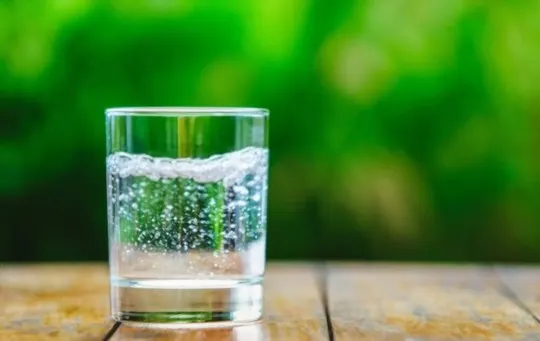
Sparkling mineral water is probably the best substitute for club soda because it’s similar in many ways.
The key difference between them is that sparkling mineral water has naturally-occurring minerals added to it, as opposed to club soda which doesn’t have any.
If you want your drink to taste as close to original with club soda, then go for a sparkling mineral water with a low mineral content (like San Pellegrino).
It won’t be exactly the same, but it should come close enough.
Sparkling mineral water is versatile and can be used in a variety of drinks or recipes.
2 – Ginger Ale
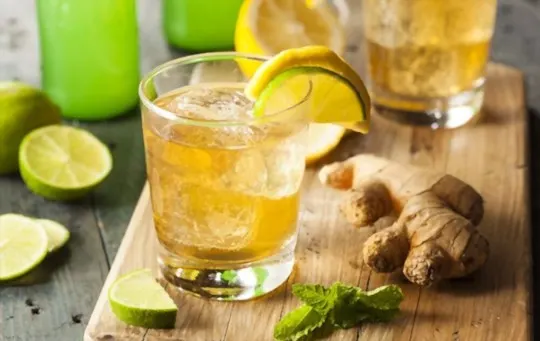
Ginger ale is a carbonated soft drink flavored with ginger and sugar, and can potentially be paired with other flavors, such as lemon-lime or raspberry.
It usually has a light to bright amber color.
Although ginger ale does not provide the same level of effervescence as club soda does, it can still offer that “fizz” sensation needed in many recipes.
Ginger ale is sweeter than club soda, so it’s best used in drinks when mixers like fruit juices are already present or when the drinker prefers the taste that comes along with extra sweetness.
If a recipe calls for reducing the amount of club soda required and adding water instead, then ginger ale can be added to reach the desired flavor profile.
3 – Seltzer
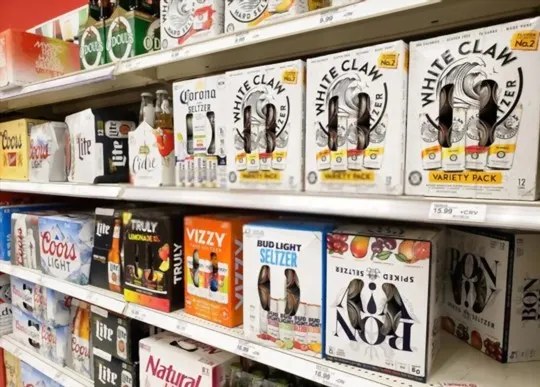
Made of only water and carbon dioxide, seltzer is a popular carbonated beverage that can be used as a direct substitute for club soda.
It has the same bubbly texture and claims the same refreshing taste.
Also known as sparkling or soda water, it does have its subtle differences from club soda.
Club soda contains minerals for flavor and sodium for taste, but these ingredients are absent in seltzer.
Seltzer also often has a more natural taste than club soda because it doesn’t contain any additional sweeteners.
Because of this, however, it’s not recommended in cocktails since these require the addition of sweet simple syrups to balance out the flavor profiles.
4 – Carbonated Juice
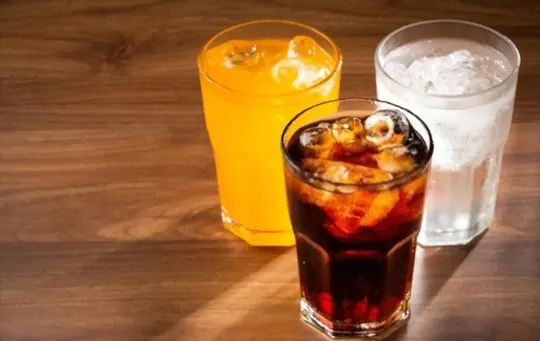
Carbonated juice offers an excellent flavor and texture that is similar to club soda, but with added fruit or other flavor.
The slightly sweet-tart flavor and carbonation provide an interesting twist for mixed drinks.
If you’re looking for a sophisticated replacement for club soda, try a light carbonated juice – such as cranberry, grapefruit or apple.
Just be careful not to add too much as it can change the taste of your cocktail significantly.
Additionally, if you’re using juices with high sugar levels (such as any tropical variety), you may want to add a bittering agent to balance out the sweetness.
5 – Tonic Water
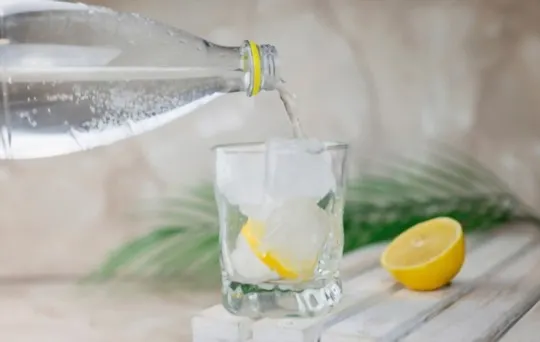
Tonic water is similar to club soda but contains quinine, a bitter compound found primarily in the bark of the South American cinchona tree.
This adds a slightly bitter, citrus-like flavor as well as a pale yellow color.
It also contains sugar, so unlike club soda it can’t be classified as calorie-free.
However, some diet tonic waters are sweetened with low calorie synthetic sweeteners.
Tonic water is perfect for pairing with gin and vodka in various types of cocktails and provides flavor similar to that of club soda, with higher carbonation levels due to its higher sugar content.
Conclusion
There are numerous options to choose from when it comes to club soda substitutes.
When making cocktails or drinks and you don’t have club soda on hand, try using one of these substitutes.
Whether you prefer sparkling water for its taste, lemon-lime soda for its sweetness, or seltzer water for its versatility and slight fizz – each of the above makes a great substitute for club soda.
Whichever you opt for will depend on the type of drink you’re planning on making and your personal preference.
Keep in mind that some substitutes can affect the flavour of your drinks more than others, so strive to find one that suits your specific needs.
Frequently Asked Questions
What is Club Soda?
Club Soda is a type of carbonated water that has minerals and salt added in order to give it a slightly salty taste.
It is often used as an ingredient in mixed drinks and cocktails.
What are the 5 BEST Substitutes for Club Soda?
The 5 BEST Substitutes for Club Soda are plain sparkling water, tonic water, ginger ale, seltzer water, and lemon-lime soda.
How can Club Soda be used in cocktails?
Club Soda can be used in cocktails to add a subtle carbonated and salty flavor.
It can also be used to dilute strong spirits and to add volume to a drink.
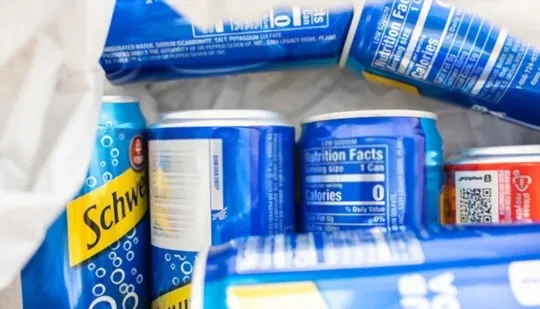
5 BEST Club Soda Substitutes You Should Consider
Ingredients
- 1 – Sparkling Mineral Water
- 2 – Ginger Ale
- 3 – Seltzer
- 4 – Carbonated Juice
- 5 – Tonic Water
Instructions
- Choose your preferred substitute from the list of options.
- Organize all of your ingredients.
- Use the proper substitute to cook your recipes.

Carrie is a food writer and editor with more than 15 years of experience. She has worked for some of the biggest names in the food industry, including Bon Appétit, Food & Wine, and Martha Stewart Living.
As the Editor in Chief of IntroChicago.com, Carrie oversees all of the content on the site. She also manages the team of contributing writers and editors, who help to create delicious recipes, helpful tips, and informative articles that you’ll find on the site.
A native of the Chicago area, Carrie is passionate about all things food. She loves trying new restaurants and experimenting with new recipes in her kitchen. She’s also a graduate of the Culinary Institute of America, so she knows a thing or two about food!
